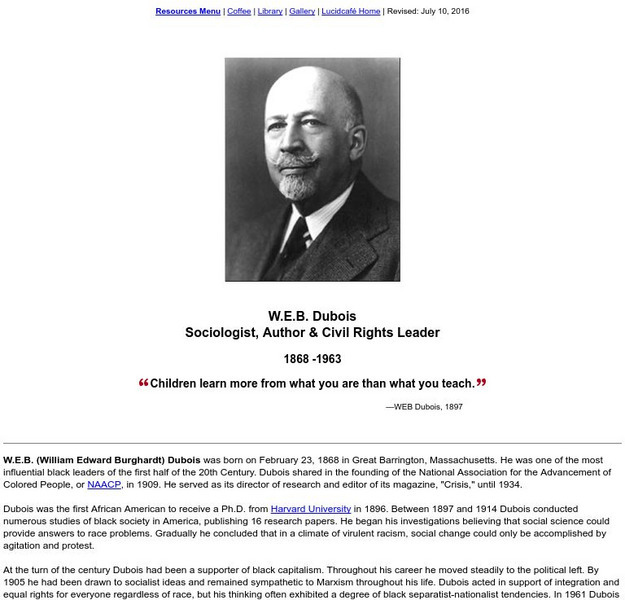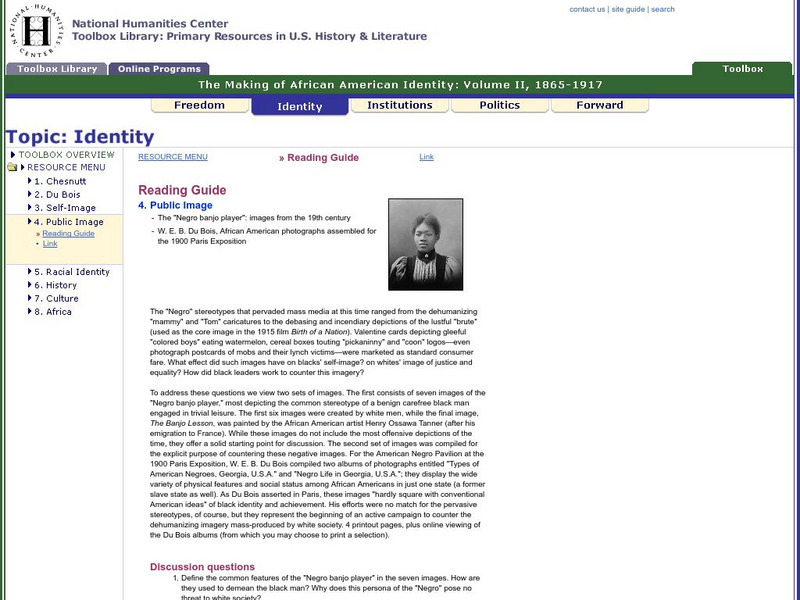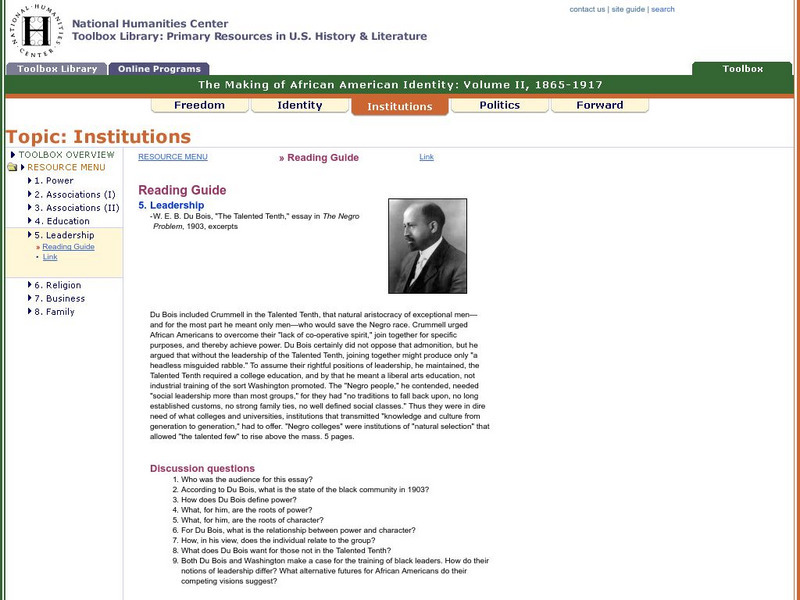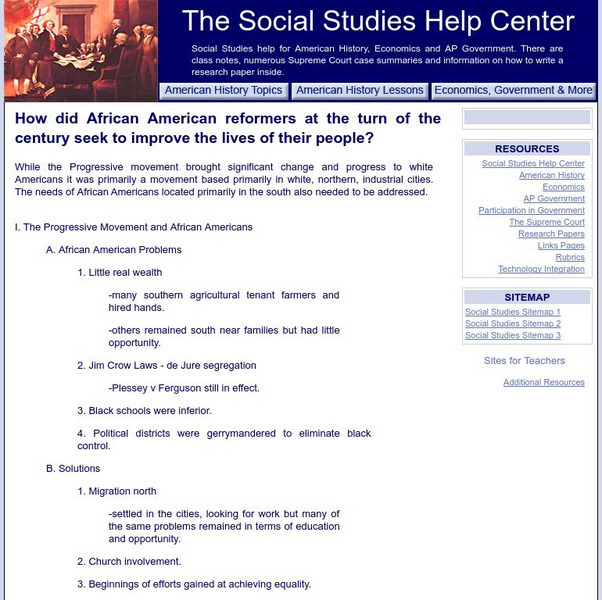Digital History
Digital History: Two Paths Towards Equality [Pdf]
During the time of rising segregation in the late 19th century two African-American leaders offered two opposite views about how to advance civil rights for African-Americans. Read about the philosophies of those leaders. Booker T....
My Hero Project
My Hero: w.e.b. Du Bois
The fist African American to earn a PhD from Harvard, W.E.B. DuBois was not only an inspirational and extraordinary individual, but a champion in the fight for equality and the end of racism. Read about his founding of the organization...
Project Gutenberg
Project Gutenberg: The Souls of Black Folk by W. E. B. Du Bois
This famous examination of the struggle for identity and equality is presented in multiple digital formats.
University of Massachusetts
U Mass Amherst: Du Bois Central
A collection of resources about W.E.B. DuBois, founder of the NAACP, who committed his life to opposing racial and social injustices. Includes photographs, papers, information on the Niagara Movement, exhibits, timeline, and a biography...
Curated OER
History Matters: Du Bois on Garvey
The full title of this article by W.E.B. DuBois is "The Collapse of the Only Thing in the Garvey Movement Which Was Original or Promising." DuBois wrote in detail about the collapse of the Black Star Line, Garvey's steamship line which...
Georgia Humanities Council and the University of Georgia Press.
New Georgia Encyclopedia: w.e.b. Du Bois in Georgia
Biographical summary of the early life and career of educator and civil rights activist William Edward Burghardt Du Bois. While living in Georgia, he wrote some of his best-known works on black social conditions.
Robin Chew
Lucid Cafe: Du Bois Overview and Links
An overview of the life and career of W.E.B. DuBois. Provides information pertaining to his political interests and his involvement in the NAACP. Related links to other civil rights leaders and issues are presented.
Black Past
Black Past: Du Bois, William Edward Burghardt
This brief encyclopedia article gives information about W. E. B. DuBois, the controversial founder of the NAACP. He was the foremost black intellect of the early 1900's.
Curated OER
Wikipedia: Natl Historic Landmarks in Ma: w.e.b. Dubois Boyhood Homesite
This site contains all that remains of the childhood home of African American intellectual and activist W.E.B. Du Bois (1868-1963). The property, which belonged to his family for over 200 years, is seasonally open to the public.
National Humanities Center
National Humanities Center: Toolbox Library: Making of African American Identity: Public Image
The resources examines images that illustrate and challenge black stereotypes of the late-nineteenth century, primarily focusing on W. E. B. Du Bois' African American photographs assembled for the 1900 Paris Exposition.
National Humanities Center
National Humanities Center: Toolbox Library: Leadership, Making of African American Identity: V. 2
Essay in which W. E. B. Du Bois discusses the need for a black elite. This essay, "The Talented Tenth" is provided, illustrating his efforts to improve the social standing of African Americans.
Curated OER
W. E. B. Du Bois
A speech by Mary Church Terrell, a letter by Booker T. Washington, a letter by W.E.B. DuBois, and the Niagara Movement's Declaration of Principles describe African American civil rights strategies in the early-twentieth century.
ClassFlow
Class Flow: Booker T. Washington and w.e.b. Du Bois
[Free Registration/Login Required] This flipchart compares and contrasts the African American leaders of the late 1800's and early 1900's. It includes Venn Diagrams, quotes, pictures, and poetry.
National Humanities Center
National Humanities Center: Toolbox Library: African Americans, the Gilded and the Gritty: 1870 1912
A speech by Mary Church Terrell, a letter by Booker T. Washington, a letter by W.E.B. DuBois, and the Niagara Movement's Declaration of Principles describe African American civil rights strategies in the early-twentieth century.
Curated OER
W.e.b. Du Bois
This NPR archive story discusses W. E. B. DuBois' exploration of America's ongoing struggle with race. Michele Norris presents a reexamination of The Souls of Black Folk, on the book's 100th anniversary.
Siteseen
Siteseen: American Historama: Niagara Movement
Learn about the Niagara Movement, a black civil rights organization formed in 1905 formed by W. E. B. Du Bois and William Monroe Trotter.
Social Studies Help Center
Social Studies Help Center: Turn of the Century African American Reformers
A brief outline of information about African Americans & reform during the Progressive Era. Links to more information on Booker T. Washington, W.E.B. Du Bois, and Marcus Garvey.
Cengage Learning
Houghton Mifflin: Gwendolyn B. Bennett
Although this site is intended for teachers in class preparation, it is information packed and has thought provoking questions at the end.
PBS
Pbs: The Black Press: Newspapers
At this PBS site, read about the histories of eight African-American newspapers: The Chicago Defender, The California Eagle, The Afro-American, The Pittsburgh Courier, Amsterdam News, Atlanta Daily World, Freedom's Journal, and Norfolk...
Georgetown University
Georgetown University: Sterling A. Brown (1901 1989)
Resource includes theme, perspective, form, style and audience of this famous Harlem Renaissance author's work.
Georgetown University
Georgetown University: Langston Hughes (1902 1967)
Excellent research site on Langston Hughes. Includes theme, perspective, form, style, audience, comparison and contrast of the famous Harlem Renaissance author's work.
Other
Wired for Books: "Their Eyes Were Watching God"`
Professors discuss the book by Zora Neale Hurston. Gives insight into the style and character analysis.
Other
New Georgia Encyclopedia: Progressive Era
A good overview of the reforms that were instituted not only in Georgia, but in the entire country during the Progressive Era. Read a history of the beginnings of progressivism, the people involved, and a recounting of the various...


![Digital History: Two Paths Towards Equality [Pdf] Website Digital History: Two Paths Towards Equality [Pdf] Website](https://d15y2dacu3jp90.cloudfront.net/images/attachment_defaults/resource/large/FPO-knovation.png)















